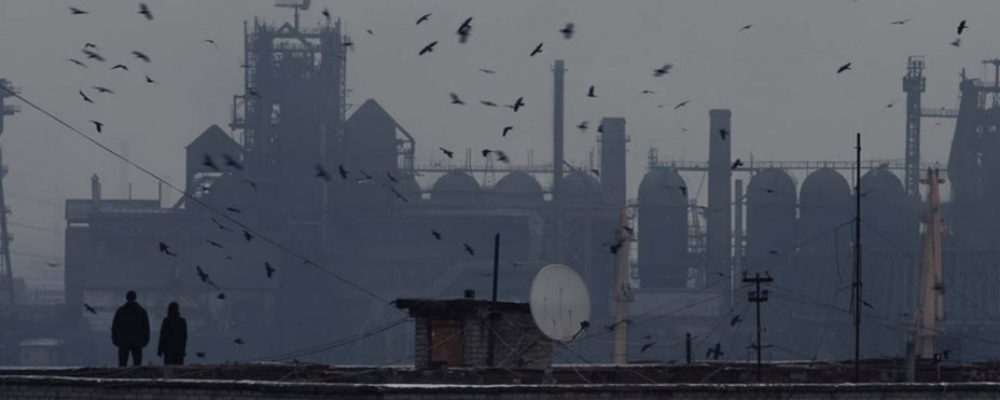The Hollywood Reporter makes a review of the winner of this year Venice IFF Horizons Competition – the film by Valentyn Vasyanovych ‘Atlantis’
Winner of best film in Venice’s Horizons section, Valentyn Vasyanovych’s film imagines a near-future Ukraine victorious in its war with Russia but economically, morally and ecologically devastated.
What might the embattled Ukraine’s future be six years from now, asks Atlantis? The legendary submerged continent of the title casts a lugubrious shadow over Valentyn Vasyanovych’s grimly filmed story, which is set in 2025 after patriotic forces in the Eastern Ukraine have finally brought the long war with Russia to an end. But not all is well in this anguished time-shifting story, told through the eyes of a soldier suffering from PTSD who has lost his family, home and the very meaning of life in the war.
The fifth feature of award-winning Ukrainian director, producer and DP Vasyanovych (Business As Usual, Credens) took home best film laurels from the Horizons competition at the Venice Film Festival, by happy coincidence on the same day that imprisoned Ukrainian filmmaker Oleg Sentsov was released by Russia in a prisoner exchange.
Dominated by men pouring molten metal and manipulating heavy machinery, big trucks and earth movers, the film has “macho” written all over it and at first sight seems aimed mainly at the wearers of muddy combat boots. But this impression gradually softens as the film goes on and two female characters appear to somewhat balance the testosterone.
Vasyanovych, who wrote, directed, filmed and edited, opens on a chilling infrared image shot from directly overhead. The hot orange outline of a man is distinguishable, and he is engaged in digging a grave. Then three other figures appear. One is struck on the head and dragged into the grave, still glowing with life until the earth blacks him out. It is a shot that is movingly echoed, in a very different life-affirming context, at the end of the film.
It is one year after the war. Sergiy (Andrii Rymaruk) and Ivan are former soldiers who work at the local steel mill, unable to let go of their old military life. Dressed in black combat uniforms, they set up life-size metal men in the snow and use them for target practice. They are both crack shots but they keep upping the ante, shooting wildly until they almost kill each other.
The shell shock is more apparent in Ivan’s case. He admits he hasn’t slept in ages and one night, chewed out at the factory for sloppy work, he commits suicide in a shocking leap. Some time later, an English-speaking CEO addresses the factory hands on a giant Big Brother screen and announces they are closing down the plant to pursue new technologies that offer new opportunities to Ukraine. Or as one worker bluntly comments, the Americans are eliminating their steel-making competition.
In the post-war world, all the water is polluted. Sergiy takes a gig driving a huge triple axle water carrier on alternate weeks. His new job takes him into the dangerous “Zone”, an area where land mines are still being cleared. It is here he meets Katya (Liudmyla Bileka), whose truck, much smaller than his own, has broken down and needs to be towed to the city. She studied archaeology but now works as a paramedic and photographer for a volunteer team who dig up soldiers’ bodies from unmarked graves and try to identify them. That night Sergiy gets his first glimpse of a working forensic team in a scene all the more indelible for the unemotional way it is shot, in head-on fixed frame with no camera movement or lighting frills.
The film’s most striking scenes involve watching the pathologist’s cold-blooded identification of bones and body parts on cadavers that are so decomposed they’ve turned into mummies. Sergiy joins the team when he isn’t driving his rig. Though battle-hardened, he gags (as will the audience) at the endless procession of corpses coming out of mass graves, which the team leader briefly describes before the remains are zipped into body bags. Katya explains to him that the reason they are doing this is to bring closure to the families and to the dead soldiers themselves, by identifying them and “completing their war.”
Vasyanovych shoots these horrific scenes with the same detachment that he views big army trucks plowing stoically through muddy roads, or huge concrete mixers filled with industrial waste pouring their molten contents into a stone quarry. The careful setups and fixed camera seem to offer some measure of firm certainty in the slippery post-war world.
From the rooftop of the industrial building where Sergiy lives, he watches the scary futuristic beauty of the factory spouting smoke and blue flames into the night. In the poisoned countryside, nothing grows in the masculine landscape of rocks and metal, which have taken on gray-green industrial tones. Armored trucks rumble over squishy mud, combat boots trample through rain and mire. At one point Sergiy rigs an ingenious hot bath in the rusty jaws of a discarded earth mover.
When Sergiy saves the life of a young woman who is in Ukraine on a humanitarian mission, she offers him a job in Europe. The ecological damage to the soil and water, she tells him, is so great it will take a hundred years to detoxify and make safe for human life. But there is little doubt where Sergiy and Katya’s future lies in this dark yet humanly luminous story.
Link to the full article: https://www.hollywoodreporter.com/review/atlantis-1237755









